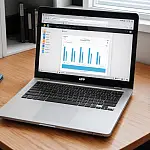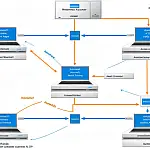The Top 11 Local SEO Tips for Small Businesses in 2024If you are a locally focused business, you must tap into the power of local search. Local SEO should be a key tactic in your SEO strategy.
If you're a small business owner looking to attract more local customers, optimizing your website for local search is essential. These local SEO tips will help you improve your local search rankings and increase your visibility to potential customers in your area.
What is Local SEO?
Local SEO is one of the essential components of every business and brand that wants long-term success across search engines.
Local SEO has grown significantly over the last few years, particularly given the rise of mobile phone usage and better connectivity while out and about. Although it has a lot of similarities with organic SEO, it's ultimately very different. Local SEO is focused on providing results that are relevant to a searcher based on their current location. If I search for "Italian restaurant" Google would provide me with results that are nearest to me. Local SEO is about getting your business to the top of this list.

Create a Google My Business Listing for Optimal Local SEO
One of the most important steps in improving your local search rankings is to claim and optimize your Google My Business listing. When people search for a business online they are primarily after one of three things - directions, telephone number and address. Google My Business (GMB) is a free tool which enables you to put these details as well as add photos, respond to customer reviews, and showcase your products or services, all directly on Google Search and Maps.
When setting up your account, make sure that you associate your listing with the right category. "Italian restaurant" is a better category than just "restaurant" as it is more specific to what you offer and will match exactly with people looking for Italian restaurants.
Encourage Online Reviews from Satisfied Customers
One of the most effective ways to improve your local search rankings is by encouraging online reviews from satisfied customers. Positive reviews not only help build trust and credibility for your business, but they also signal to search engines that your business is reputable and relevant to local customers. Encourage your satisfied customers to leave reviews on platforms like Google My Business, Yelp, and TripAdvisor. You can do this by including a call-to-action in your email newsletters, on your website, or even in-person at your business location. Make it easy for customers to leave reviews by providing direct links or instructions on how to leave a review. Remember to respond to all reviews, both positive and negative, to show that you value customer feedback and are committed to providing excellent service.
Optimise for Mobile AND Local SEO
Making your website mobile-friendly is essential for good SEO in general. However, it's specifically important for local SEO.
People like fast sites. Ensuring your site loads quickly and is easy to use and understand on a mobile device is important for SEO. If your site takes too long to load or does not work well on mobile, users will simply bounce away and go elsewhere.
Get on Relevant Review Sites
Online reviews are a huge influence on people's decision-making process. This makes your presence on the major review sites critical. Encourage customers to leave reviews, good or bad, as this is seen as being honest and open, building trust.
Review sites you should consider being on include:
- Yelp
- Yellow Pages
- Google+ Local
- TripAdvisor
- Yahoo Local
Target Local Keywords for Local SEO
One of the basics of SEO is keyword targeting. Local SEO is no different. By targeting local keywords, you can reach people looking for your business in the local city or region. Local keywords are pretty self-explanatory, but you should still research the longer-tail local keywords for your business.
For instance, if your business is a plumbing company in Edinburgh, you'll want to compare search volumes for different variations of search terms like "plumber edinburgh", "plumber lothian" You may also want to drill down into hyper-local keywords, such as "central heating repair Morningside".
You'll want to make sure that your home page and any service pages contain the local keywords you want to rank for in the headings, meta tags, images and body content.
Use Schema Markup
Schema markup is a specific code you add to your HTML to improve the way your page is represented in search results. The code helps Google recognise certain elements of your page and tells them what the content on your page means. Using the data provided in the schema markup Google can potentially list key information in the search results without users having to click through to your website.
Local Link Building
Having a strong link profile is vital to performing well in search, and entire businesses (some with good link-building practices and some bad) have been built on securing such links.
Local links get people talking about your brand and help raise awareness. There are different ways to get local links. Most towns and cities have local business awards, so have a look around and get involved. Put your name forward for an award, even if you don't win it, you can still get some good publicity. Try sponsoring a local event, again, you can get some good publicity for a little outlay. Better yet, try hosting an event of some kind.
Bing Places for Business
Don't forget about the other search engine. Bing has its own version of GMB, called Bing Places for Business . Make sure that your business is listed there as well as Bing is the second most popular search engine after Google.
Use Rich Media
These days people want to see what you are about, photos of your products, 360° photos, virtual tours and so on. Let people know a little more about your business by including lots of pictures on your GMB page. If you really want to stand out and let people take a peek inside your business, you can also add a virtual tour to GMB.
Optimise your URL, Tags & Content
Your URL, title tags, headers, meta descriptions and content should include your city or region and the target keyword of the page they describe. This tells Google what geographical location the page is relevant to and what content is on the page - and it helps them index your page accordingly. Don't try and stuff keywords into the pages, however, Google are wise to do this and you will be penalised or even delisted for keyword stuffing.
Keep your Details Consistent
It should go without saying, however, some companies fail to do this. It is important to have your details correct, up to date and consistent across all your channels. If you have a different number on your website than you do on your GMB page then this will be confusing to your customers.
Were these Local SEO tips useful for you? Have you any more Local SEO tips to share? Let us know in the comments below!










